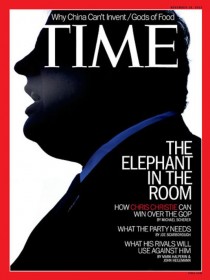Republican establishment front-runner Chris Christie’s landslide victory in New Jersey’s gubernatorial election on Tuesday could not have come at a better time for Christie supporters.
Mark Halperin and John Heilemann’s just-released book on the 2012 presidential election, Double Down, documents in a rather unflattering way Mitt Romney’s decision not to select Christie as his vice-presidential running mate. Romney’s team found Christie too large, too loud, and, for many a campaign event, too late. Most troubling for some in the Romney camp was the feeling that there were too many skeletons in Christie’s lobbying closet. One high-level staffer posited, “If Christie had been in the nomination fight against us, we would have destroyed him.”
Halperin and Heilemann report that Romney had two principal criteria in vetting potential running mates: that “they be qualified and immediately perceived as qualified to be Commander in Chief, and that there be nothing in their background that could become a distraction for the campaign.” Christie’s past was a distraction.
But Christie seems to have lost on style points more than anything else, given the marked contrast between his person and persona and those of the athletic, deliberate, altar-boyish Paul Ryan that Romney chose to take to the presidential prom.
Whether Christie is ultimately the man for the Republican party establishment remains to be seen. If they’re looking for someone who wins elections by countering Democratic Progressivism with everyman pragmatism, they need look no further. His “whatever works for New Jersey” approach to governance certainly satisfies the postmodern demand for a politics big on personal authenticity but wary about moral absolutes.
Can “whatever works for America” carry Christie to victory in 2016? That may depend on whether bully pragmatism sells better than Romney’s consultant pragmatism.
But the more important question is whether “whatever works for America” will actually work for America.
A political party that is more than mere faction asks first: what does the country need? A political party that is more than a debating society then asks: what does the country want? The United States needs, most of all, to arrest its march toward national suicide–whether by social disintegration or fiscal insolvency.
The GOP establishment, allergic to uncomfortable moral claims, wants to ignore the first problem and manage the second. Their pragmatist track record suggests, however, that even on their chosen (fiscal) ground, they will be a generation late and a $100 trillion short–exactly because of their unwillingness to acknowledge the moral root of our will-to-bankruptcy.
In Federalist 15, Alexander Hamilton exposes the limits of such halfway politics:
It is true, as has been before observed that facts, too stubborn to be resisted, have produced a species of general assent to the abstract proposition that there exist material defects in our national system; but the usefulness of the concession, on the part of the old adversaries of federal measures, is destroyed by a strenuous opposition to a remedy, upon the only principles that can give it a chance of success.
A serious remedy to the problems that arose under the Articles of Confederation required a willingness to confront and correct the ultimate source of the trouble, what Hamilton called the “great and radical vice” of the system.
Members of the GOP establishment and the ruling class in general are typically willing to acknowledge that our current entitlement regime is unsustainable. Yet insofar as they either support or are unwilling to fight its expansion through Obamacare or suggest that a relatively minor tweak in tax rates or benefits can resolve our difficulties, they commit the same error identified by Hamilton in his critique of anti-Federalists.
The “great and radical vice” of our entitlement system is its dependency on an intergenerational transfer of wealth from the young to the old. This would work financially if the size and life expectancy of every generation were the same—but it is a formula for disaster in the real world, where life expectancy is increasing and fertility rates are decreasing.
The results are predictable: in 1960, there were five workers for every Social Security beneficiary. By 1965, it was 4. Since 2010, it has been less than 3, on its way to 2.2 in 2030.
 What has been the pragmatist response to this long-foreseen problem? Modest increases in tax rates and the retirement age and massive increases in programs and beneficiaries, including the addition of Medicare in 1966, the prescription drug benefit in 2003, and now Obamacare–plus gimmicks like the Social Security Trust Fund that make it look like the math works for a while longer.
What has been the pragmatist response to this long-foreseen problem? Modest increases in tax rates and the retirement age and massive increases in programs and beneficiaries, including the addition of Medicare in 1966, the prescription drug benefit in 2003, and now Obamacare–plus gimmicks like the Social Security Trust Fund that make it look like the math works for a while longer.
Pragmatism plainly hasn’t worked even with its willingness to overlook the immorality of this intergenerational transfer. Consider this: those who turned 65 in 1960 got more than $6 from Social Security for every dollar they put in. Those who retired in 1980 got $2.12; 2010, $0.92. And those who retire in 2030? $0.84. This isn’t about social contract justice; it’s about winning (and more and more losing) the generational lottery.
But even this understates the injustice to the young since, despite this negative return on their “investment,” Social Security and Medicare will add $344 billion to the national debt in 2013–with no end to the red ink in sight.
Any serious entitlement reform has to start with the principle that each generation pays its own way–and the closer we can get to a system where each individual pays his own way, the better. There are any number of ways to do this that continue to protect the genuinely disabled and disadvantaged.
But efforts to address our fiscal crisis that leave its principal cause in place can only succeed at reinforcing the pragmatist’s rob Peter (tomorrow) to pay Paul (today) ethic, so toxic to our national political health.
And is Governor Chris Christie ready for this challenge? His time in Trenton suggests otherwise. To his credit, he’s negotiated more budget-friendly contracts with public employee unions and dedicated more monies to long underfunded state pension liabilities.
But, after two years of fiscal discipline, he has expanded spending rapidly in his last two budgets and used one-time payments and short-term gimmicks to balance them. And while it’s good local politics to jawbone Congressmen holding up federal disaster relief money, there’s no one to turn to when the Washington well runs dry–except the already overburdened generations to come, who offer a very convenient exception to that most American of political principles: “no taxation without representation.”
Our honor and their justice demand a different way forward: one that, to paraphrase Lincoln, just might make the republic we save a republic worth saving. For the Republican party and the United States, that’s the real elephant in the room.
David Corbin is a Professor of Politics and Matthew Parks an Assistant Professor of Politics at The King’s College, New York City. They are co-authors of “Keeping Our Republic: Principles for a Political Reformation” (2011). You can follow their work on Twitter or Facebook.









